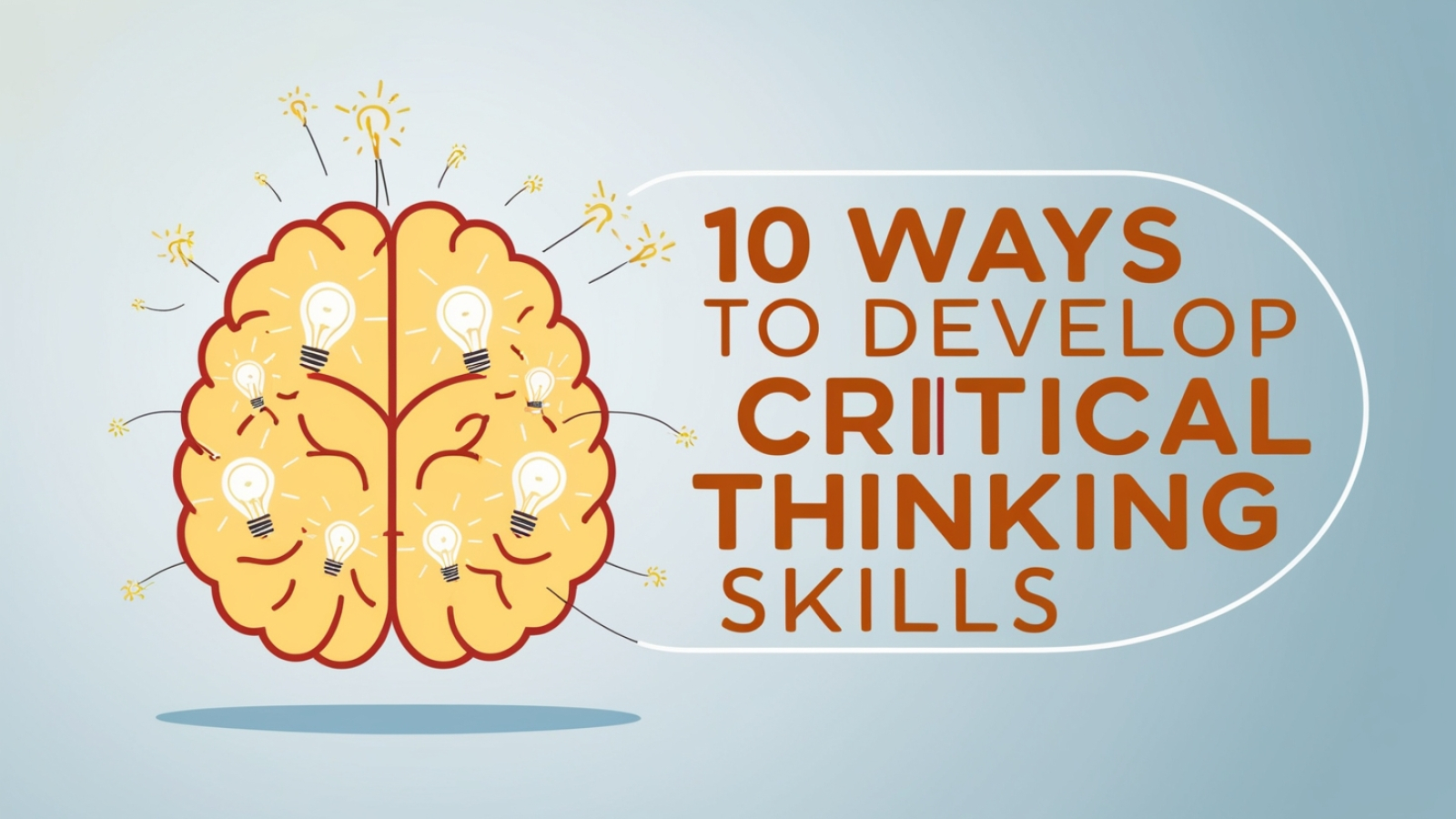Critical thinking is an essential skill in today’s fast-paced and ever-changing world. It enables you to analyze information, make informed decisions, and solve problems effectively. Developing critical thinking skills can enhance your professional and personal life by improving your ability to reason, reflect, and make sound judgments. Here are 10 ways to develop critical thinking skills.
1. Question Assumptions
a. Challenge Your Beliefs
Start by questioning your own assumptions and beliefs. Consider why you hold certain views and whether they are based on evidence or mere speculation.
Example: If you believe a particular method is the best way to solve a problem, ask yourself why you think so and explore alternative approaches.
b. Seek Diverse Perspectives
Engage with people who have different viewpoints to broaden your understanding and challenge your assumptions.
Example: Discuss your ideas with colleagues from different departments or backgrounds to gain new insights.
2. Develop Curiosity
a. Ask Open-Ended Questions
Cultivate curiosity by asking open-ended questions that encourage exploration and deeper thinking.
Example: Instead of asking, “Is this project feasible?” ask, “What are the potential challenges and opportunities of this project?”
b. Embrace a Learning Mindset
Adopt a mindset of continuous learning and curiosity about the world around you.
Example: Read books, attend seminars, and participate in online courses to expand your knowledge and stimulate critical thinking.
3. Analyze Information Critically
a. Evaluate Sources
Critically evaluate the credibility and reliability of information sources.
Example: Check the author’s credentials, the publication date, and the source’s reputation before accepting information as accurate.
b. Identify Biases
Be aware of potential biases in the information you consume and strive to recognize your own biases as well.
Example: Consider the perspective of the information source and any potential motives behind the content.
4. Develop Analytical Skills
a. Break Down Complex Problems
Practice breaking down complex problems into smaller, manageable parts to better understand and address them.
Example: Use tools like mind mapping or flowcharts to visualize and analyze different aspects of a problem.
b. Use Logical Reasoning
Apply logical reasoning to analyze situations and make decisions based on evidence and sound principles.
Example: Use deductive and inductive reasoning to draw conclusions from available data.
5. Reflect on Your Thinking Process
a. Practice Metacognition
Engage in metacognition, or thinking about your thinking, to become more aware of your cognitive processes.
Example: After making a decision, reflect on the steps you took and consider how you could improve your thinking in the future.
b. Keep a Reflection Journal
Maintain a journal to document your thoughts, decisions, and reflections. This practice can help you identify patterns and areas for improvement.
Example: Write about challenges you faced, how you approached them, and what you learned from the experience.
6. Engage in Thoughtful Dialogue
a. Participate in Discussions
Engage in thoughtful discussions with others to test your ideas and gain new perspectives.
Example: Join a debate club, participate in forums, or have in-depth conversations with friends and colleagues.
b. Practice Active Listening
Listen actively and attentively to others’ viewpoints, and consider their arguments carefully before responding.
Example: Summarize the speaker’s points to ensure you understand their perspective and respond thoughtfully.
7. Solve Puzzles and Brain Teasers
a. Engage in Puzzles
Solve puzzles, riddles, and brain teasers to enhance your problem-solving and critical thinking skills.
Example: Spend time on activities like Sudoku, crossword puzzles, and logic games to stimulate your brain.
b. Play Strategy Games
Participate in strategy games that require planning, analysis, and decision-making.
Example: Games like chess, Go, and strategy-based video games can help improve your critical thinking abilities.
8. Learn to Identify Fallacies
a. Study Logical Fallacies
Learn about common logical fallacies and how to identify them in arguments.
Example: Familiarize yourself with fallacies like ad hominem, straw man, and false dichotomy, and practice spotting them in discussions and media.
b. Avoid Fallacious Reasoning
Strive to avoid fallacious reasoning in your own arguments by ensuring your claims are well-supported and logical.
Example: Ensure that your arguments are based on evidence and sound reasoning rather than emotional appeals or faulty logic.
9. Read Widely and Critically
a. Diversify Your Reading
Read a wide range of materials, including books, articles, and research papers from various fields and perspectives.
Example: Explore topics outside your area of expertise to gain new insights and stimulate critical thinking.
b. Read Critically
Approach reading materials with a critical mindset, questioning the validity and reliability of the content.
Example: Evaluate the arguments presented, assess the evidence, and consider alternative viewpoints.
10. Practice Decision-Making
a. Make Informed Decisions
Practice making decisions based on thorough analysis and critical evaluation of available information.
Example: Use decision-making frameworks, such as SWOT analysis or decision trees, to systematically evaluate options.
b. Reflect on Outcomes
After making a decision, reflect on the outcome and what you can learn from the process.
Example: Analyze both successful and unsuccessful decisions to understand what worked well and what could be improved.
Conclusion
Developing critical thinking skills is a continuous process that involves questioning assumptions, cultivating curiosity, analyzing information, reflecting on your thinking process, engaging in thoughtful dialogue, solving puzzles, identifying fallacies, reading widely, and practicing decision-making. By incorporating these strategies into your daily routine, you can enhance your ability to think critically and make better decisions in both your personal and professional life.




Add a Comment